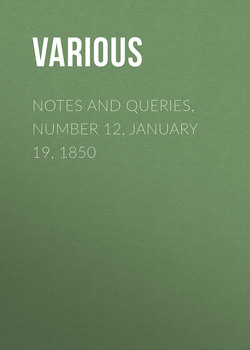Читать книгу Notes and Queries, Number 12, January 19, 1850 - Various - Страница 6
NOTES
SEWERAGE IN ETRURIA
ОглавлениеI have been particularly struck, in reading The Cities and Cemeteries of Etruria, of George Dennis, by the great disparity there appears between the ancient population of this country and the present.
The ancient population appears, moreover, to have been located in circumstances not by any means favourable to the health of the people. Those cities surrounded by high walls, and entered by singularly small gateways, must have been very badly ventilated, and very unfavourable to health; and yet it is not reasonable to suppose they could have been so unhealthy then as the author describes the country at present to be. It is hardly possible to imagine so great a people as the Etruscans, the wretched fever-stricken objects the present inhabitants of the Maremna are described to be.
To what, then, can this great difference be ascribed? The Etruscans appear to have taken very great pains with the drainage of their cities; on many sites the cloaca are the only remains of their former industry and greatness which remain. They were also careful to bury their dead outside their city walls; and it is, no doubt, to these two circumstances, principally, that their increase and greatness, as a people, are to be ascribed. But why do not the present inhabitants avail themselves of the same means to health? Is it that they are idle, or are they too broken spirited and poverty-stricken to unite in any public work? Or has the climate changed?
Perhaps it was owing to some defect in their civil polity that the ancients were comparatively so easily put down by the Roman power, which might have been the superior civilisation. Possibly the great majority of the people may have been dissatisfied with their rulers, and gladly removed to another place and another form of government. It is even possible, and indeed likely, that these great public works may have been carried on by the forced labour of the poorest and, consequently, the most numerous class of the population, and that, consequently, they had no particular tie to their native city, as being only a hardship to them; and they may even have had a dislike to sewers in themselves, as reminding them of their bondage, and which dislike their descendants have inherited, and for which they are now suffering. At any rate, it is an instructive example to our present citizens of the value of drainage and sanitary arrangements, and shows that the importance of these things was recognised and appreciated in the earliest times.
C.P.F.
